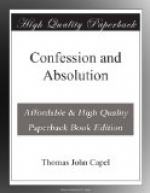The passage is exceptionally clear, and for fifteen centuries was accepted in its plain grammatical signification. Our Lord, who is possessed of all power in heaven and on earth, makes His Apostles “workers together with Him” in the forgiving of sin. They derive the power from Him, and receive it by the inbreathing of the Holy Spirit. It is no product of their learning, or experience, or piety, nor is it any right inborn in them; but it is a divine gift, given by the redeemer to His priests for the sanctification of souls. By it are His legitimate ministers made co-operators in the work of reconciliation. Already had the Scribes thought that Jesus blasphemed when He said to the man sick of the palsy: “Son, be of good heart: thy sin is forgiven thee.” They realized not that the Almighty could impart the power of pardoning to His creatures. To convince them that the Son of Man hath power to forgive sin, Jesus performed this special miracle, and healed the man of the palsy. The multitude, seeing this, feared and glorified God, who had given such power to men.[31] The power is of God, who alone can forgive sin, though He exercises it through men as channels of His grace. The power of working miracles in like manner belongs to God’s omnipotence; yet did He condescend to allow His Apostles and others to share in it. In this they were but His delegates.
The passage, in the next place, expresses judicial power: for the commission draws the distinction between remitting sin and retaining sin. This exercise of discretionary power does not depend on the arbitrary will of the Apostles, but has to be decided according to the Gospel law of true repentance described previously. The Apostles are appointed ministerial judges of the dispositions of penitents, and of the sins on which they are to pronounce sentence of remission or of retention, and their sentence is as efficacious as if it were pronounced by Christ himself.
Now, it is a primary condition of just judgment that the judge should not only be cognizant of the law which is to be administered, but also of the cause submitted for judgment. Applying this to the exercise of the judicial power with which the Apostles are invested, two things are needed: the first, that they should know the law and the conditions on which sin is to be retained or remitted. This they can only learn of God. The second, that they should know the sin committed, its nature and its circumstances. This can only be learned from the sinner; for sin is a deliberate and voluntary transgression of God’s law. And, therefore, as St. Thomas of Aquinas has it, “the principle of sin is the will.” It is in the recesses of the knowledge and liberty which the soul has, that the guilt of sin is to be sought. Who then but the individual offender can know the sins for which forgiveness is asked? The disclosure can only come from the wrong-doer. Clearly then, confession, in the ordinary course of




